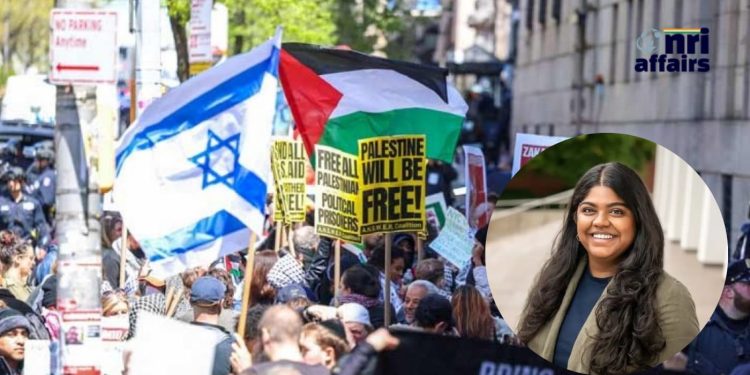In recent events, the landscape of university protests has been fraught with tension and controversy, as highlighted by the recent arrests of Indian-origin students at Princeton University, USA, amid pro-Palestine demonstrations. The incident, captured by student and alumni newspapers, sheds light on the intricate dynamics surrounding such protests and the broader geopolitical ramifications they entail. This comprehensive analysis delves into the details of the incident, examining the underlying factors, implications, and responses involved.
Contextualizing the Arrests
The focal point of the incident revolves around the arrest of two graduate students, Achinthya Sivalingan and Hassan Sayed, during pro-Palestine protests held on the Princeton University campus. These arrests, attributed to trespassing charges, occurred subsequent to the establishment of tents by protesters within a university courtyard. Despite the resonance of the protests with broader geopolitical issues, the university administration swiftly intervened, invoking disciplinary measures against the arrested students.
Unraveling the University Response
In response to the protests and subsequent arrests, the university administration, represented by spokespersons Jennifer Morrill and Michael Hotchkiss, articulated its stance on the matter. While affirming the right to peaceful demonstration, the administration emphasized adherence to university policies, citing the unauthorized setup of tents as a violation. However, amidst the enforcement of disciplinary action, nuances emerged regarding the students’ residential status and access to university housing, further complicating the narrative.
Perspectives and Reactions
The incident elicited a spectrum of reactions from various stakeholders, ranging from students and faculty to external observers. Notably, the portrayal of the arrests as “violent” by a student witness, contrasting with the university’s account, underscores the divergent interpretations surrounding the events. Furthermore, the participation of diverse constituencies in the protests underscores the multidimensionality of the issue, transcending campus boundaries to resonate with broader societal concerns.
Geopolitical Implications and Solidarity Movements
Embedded within the prism of university protests is the interconnectedness of local actions with global narratives. The surge of pro-Palestine demonstrations across top US universities underscores the transnational reverberations of the Israeli-Palestinian conflict. As students mobilize in solidarity with Gaza, demands for institutional divestment and calls for ceasefire epitomize the intersection of academic discourse with geopolitical advocacy.
Charting a Path Forward
In navigating the aftermath of the protests and arrests, it becomes imperative to chart a path forward characterized by dialogue, inclusivity, and constructive engagement. Beyond punitive measures, there lies an opportunity for universities to foster environments conducive to robust debate and civic participation. By acknowledging divergent perspectives and fostering meaningful dialogue, universities can serve as crucibles for positive social change amidst contentious global issues.
In conclusion, the events unfolding at Princeton University underscore the complex interplay between academic institutions, student activism, and global geopolitics. By dissecting the intricacies of the protests and subsequent developments, this analysis seeks to provide a nuanced understanding of the multifaceted issues at play. As universities navigate the terrain of protest management and ideological contestation, fostering dialogue and embracing diversity emerges as indispensable pillars in shaping a more inclusive and equitable future.











